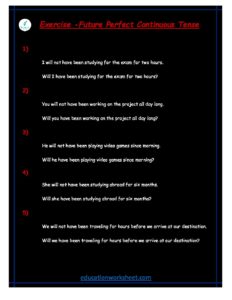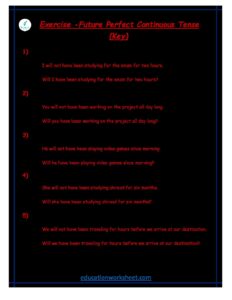Perfect Tense examples
Perfect Tense examples
Understanding Perfect Tense:
Perfect tense, also known as the perfect aspect, is a grammatical structure that highlights the completion of an action or event with respect to a specific point in time. It is widely used in English to convey a sense of time or the idea that something has been accomplished. Perfect tense is formed by combining a helping verb (usually “have” or “has”) with the past participle of the main verb.
The two primary forms of perfect tense are the present perfect and past perfect tenses, each with distinct applications and nuances:
- Present Perfect Tense: The present perfect tense is used to describe actions or situations that occurred at some indefinite point in the past but have relevance or implications for the present. It is constructed with the present tense of the auxiliary verb “have” or “has” and the past participle of the main verb.
Example 1: She has visited Paris several times. Example 2: They have never tasted sushi.
- Past Perfect Tense: The past perfect tense, on the other hand, is employed to convey that one action or event occurred before another action in the past. It is formed using the past tense of the auxiliary verb “have” (had) and the past participle of the main verb.
Example 1: When I arrived at the party, they had already finished eating. Example 2: By the time he woke up, she had already left for work.
Examples of Present Perfect Tense:

- Affirmative Sentences:
- They have completed their assignment.
- She has read that book.
- I have eaten lunch.
- Negative Sentences:
- He has not visited London yet.
- They have not finished their homework.
- She has not bought a new car.
- Interrogative Sentences:
- Have you ever traveled abroad?
- Has he seen this movie?
- Have they met the new neighbors?
- Interrogative-Negative Sentences:
- Haven’t you visited your grandparents?
- Hasn’t she finished her project?
- Haven’t they returned from the trip?
- Present Perfect with “For” and “Since”:
- She has lived in this city for five years.
- They have been friends since childhood.
- Present Perfect for Experiences:
- I have never flown in an airplane.
- Have you ever tried Indian cuisine?
- They have never watched a live football match.
Examples of Past Perfect Tense:

- Affirmative Sentences:
- She had completed her degree before she got a job.
- They had eaten dinner before the guests arrived.
- I had read the entire novel by the time the movie was released.
- Negative Sentences:
- He had not finished his presentation when the meeting started.
- We had not met each other before that conference.
- She had not bought the tickets before the concert was sold out.
- Interrogative Sentences:
- Had you finished your homework before the power outage?
- Had he left the office when you called him?
- Had they arrived at the restaurant before you?
- Interrogative-Negative Sentences:
- Hadn’t you already seen the movie when we recommended it to you?
- Hadn’t she finished her research before the conference began?
- Hadn’t they departed for the vacation when you arrived?
Uses and Significance of Perfect Tense:

The perfect tenses in English serve various functions, including:
- Indicating Completion: Perfect tenses are frequently used to highlight the completion of actions or events. They help convey the idea that something has been done or achieved, providing a sense of finality to the action.
Example: They have built a new house.
- Expressing Relevance to the Present: The present perfect tense is particularly useful for indicating actions or experiences that have a bearing on the present moment, even if they occurred in the past.
Example: I have just finished my work, so I can go to the movie with you.
- Sequencing Events: The past perfect tense is employed to establish a chronological order of events in the past, making it clear which action happened before another.
Example: She had already left for the airport when I arrived.
- Stating Unfulfilled or Hypothetical Conditions: Perfect tenses can also be used to express unrealized or hypothetical situations.
Example: If he had known the truth, he wouldn’t have acted that way.
- Talking About Experience: Perfect tenses are used when discussing personal experiences or accomplishments.
Example: I have climbed that mountain.
- Narrating Stories and Anecdotes: In storytelling, the use of perfect tenses can provide depth and clarity to the sequence of events.
Example: The detective had already solved the case when the new evidence emerged.
Common Mistakes with Perfect Tense:
- Mixing Past and Present Perfect: It’s important to use the appropriate perfect tense depending on the temporal context. Mixing them can lead to confusion.
Incorrect: I have finished my work yesterday. (Use “I finished my work yesterday.”) Incorrect: He had already read that book now. (Use “He has already read that book.”)
- Incorrect Word Order: Placing the auxiliary verb in the wrong position can result in grammatically incorrect sentences.
Incorrect: Have they gone already to the party? (Use “Have they already gone to the party?”) Incorrect: Had she eaten dinner when we arrived? (Use “Had she eaten dinner when we arrived?”)
- Omitting “Have” or “Has”: For affirmative sentences in perfect tense, it’s essential to include “have” or “has.”
Incorrect: She visited the museum. Correct: She has visited the museum.
- Using “For” and “Since” Incorrectly: While using “for” and “since” in present perfect tense, ensure that they are correctly placed to indicate the duration of an action.
Incorrect: I have lived in this city for five years. Correct: I have lived in this city for five years.

